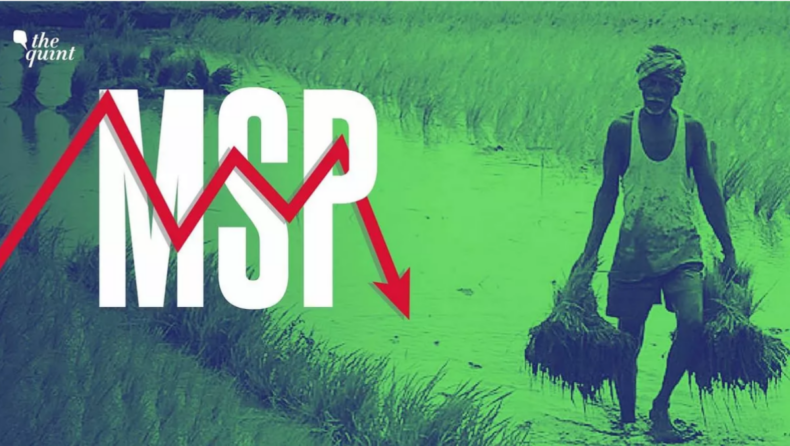The centre appoints an MSP committee to improve efficiency and transparency, but the legal guarantee that farmers are demanding is not mentioned in the notification. What is on the panel’s schedule? How will it run?
This week, the centre appoints a committee to “promote zero budget-based farming,” “alter” the country’s agricultural patterns, and “increase the effectiveness and transparency” of MSP. The Samyukta Kisan Morcha (SKM), which had spearheaded a persistent farmer movement against three agricultural regulations that have since been abolished, has retained three of the 26 seats on the committee along with the chairman. However, the SKM has said that it will not nominate any delegates and has rejected the committee.
Why has the Committee been set up?
It was established by the Ministry of Agriculture and Farmers’ Welfare in response to Prime Minister Narendra Modi’s declaration that the centre intended to repeal the three farm laws by November 19, 2021.
Based on the “C2+50% formula” (C2 is a type of cost incurred by farmers) proposed by the Swaminathan Commission, the protesting farm unions led by the SKM had wanted a legislative guarantee on MSP. They also demanded the repeal of the Essential Commodities (Amendment) Act, 2020, the Farmers (Empowerment and Protection) Agreement on price Assurance and Farm Services Act, 2020, and the Farmers Produce Trade and Commerce (Promotion and Facilitation) Act, 2020.
Will the Committee discuss the MSP legal assurance, then?
The legal guarantee of MSP is not included in its wording or references. “As per the announcement by the Prime Minister that ‘A committee will be established to support zero budget-based farming, adjust crop patterns in accordance with the changing demands of the nation, and improve the efficacy and transparency of MSP’.
On Tuesday, the issue of a legal guarantee was brought up in the Lok Sabha when the Agriculture Ministry was asked if the centre had promised the Samyukta Kisan Morcha (SKM) that a committee would be formed to legally guarantee MSP to farmers during December, 2021, and if so, what specifically that committee would do.
The Ministry replied, “No, Sir… Then, the administration promised to set up a committee to improve MSP’s effectiveness and transparency, encourage natural farming, and alter crop patterns in accordance with the nation’s shifting demands. As a result, a group made up of farmers, government officials from the federal and state levels, scientists, and agricultural economists have been established.”
What is the purpose of the committee?
The committee will examine MSP, natural farming, and crop diversification under the heading “Subject matter of composition of the committee.” MSP’s agenda is as follows:
- Suggestions to make MSP available to farmers across the nation by improving the system’s efficiency and transparency.
- Practical ideas to increase the Commission on Agricultural Costs and Prices’ (CACP) autonomy and steps to improve its scientific rigor.
- To improve the agricultural marketing system in accordance with the shifting demands… to guarantee greater value to the farmers through remunerative prices… by utilizing domestic and international opportunities.
Regarding natural farming, the committee recommends
- Strategies for transforming research and development facilities into knowledge hubs and implementing a natural farming system curriculum in educational facilities.
- recommending a farmer-friendly alternative certification programme and distribution network for natural farming practices and products
- examining several concerns, including those pertaining to the chain of laboratories used to certify natural farming products as organic.
With regard to crop diversification, the committee suggests
- Mapping of cropping pattern of agro-ecological zones.
- Plan for a diversification strategy to alter cropping practices in response to changing needs
- system to secure profitable prices for the sale of new crops, as well as arrangements for agricultural diversification.
How is MSP Fixed?
On the basis of the recommendations of the CACP, the center publishes the MSP (which is not legally guaranteed) for 22 mandatory crops (Fair and Remunerative Price, FRP for sugarcane). These comprise six rabi crops (wheat, barley, gramme, masur/lentil, rapeseed and mustard, and safflower), 14 Kharif crops (jowar, bajra, maize, ragi, tur/arhar, moong, urad, soyabean, sunflower, sesame, cotton), and two commercial crops (jute and copra).
The CACP considers a number of variables, such as demand and supply, production costs, market trends, a minimum profit margin of 50% above production costs, and potential consumer effects of MSP.
The CACP calculates three types of costs- A2, A2+FL and C2- for each mandated crop for different states.
A2 is the lowest among all. which is the actual paid-out cost incurred by a farmer.
The A2+FL, the actual paid-out cost plus imputed value of family labor.
C2 is the highest among all and defines as ‘Comprehensive Cost including Rental Value of Own Land (net of land revenue and interest on value of own fixed capital assets (excluding land))’.
Despite the fact that all three costs are assessed, the CACP ultimately recommends—and the government ultimately announces—MSP based on A2+FL. Additionally, protesting farmers are calling for a legal guarantee and MSP based on C2.












